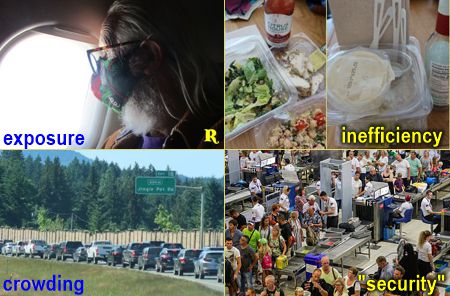| itinerary < 14 June Caspar 11 August Stinson Beach > | Contents & Conclusions 15 June 2023 |
|
What a trip! This page is a work in progress There were an unbelievable number of 'moving parts' and, incredibly, they all moved exactly as planned. Yet with even such good luck and thoughtful planning, travel,(like getting older) is not for sissies. Here, first, is a table of contents of this trip, and then, below, some reflections on the trip's meaning to me and to us. |
 |
Getting there and back: the real worldAny kind of travel involving airports is annoying and dehumanizing. The long schlep with luggage through the endless corridors, the unnecessarily long lines at security, the professionally tolerant but essentially robotic 'officers', and the righteously pissed off passengers created a thoroughly toxic atmosphere. It wasn't always like this, and doesn't need to be now. The insanity of taking one's shoes and belt off, the 4 ounce stricture: all preparing for a problem from the distant past. The real present danger: coughing, sneezing fellow travelers. If the government is so concerned about airplane safety, why not take everyone's temperature, and make travelling when sick a violation? The frustrations of travel go on and on, mostly because when we travel, we leave, by definition, our comfort zone: the place where we have learned to cope with the inconveniences. So I keep telling myself, 'if you really want to travel, suck it up, chuck!' Day after: will I travel again? Maybe not. See below where I write about travel while elderly. |
 |
TWE: Travel While Elderly'We're spending our childrens' inheritance' and why not? When younger, we traveled like students, the way we first traveled. Rochelle and my daughters traveled for 10 months around the Pacific Rim on $30 a day each including all transport. In our late seventies, that's simply not on our agenda; it's more like $130 on an inexpensive day, excluding transport. Sure, everything's more expensive in 2023 than in 1990, but the calculus has changed: our older bodies aren't able to sustain the inconveniences and exertions of budget travel. (It's an open question whether our eldering spirits can handle the indignities mentioned above.) You might notice that when enumerating the inhumanity of air travel, I didn't mention flying: it's actually pretty cool. Sure, the seats are tiny and the person behind you kicking the seat while coughing should be put in jail, but getting from YVR (Vancouver International) to SFO (San Francisco International) in one hour and firty-six minutes is a small miracle. Never mind that it's not 'sustainable.' More about that next. IF we intend to assert our membership among the global 6% or so and travel to faraway places, we need to spend enough to stay healthy and as happy as possible under trying circumstances, reminding ourselves as every C-note peels away that we can't take it with us, our offspring wiuld only spend it, and so we would do just as well either to stay home or travel in as much luxury as we can stand. |
 Pi cat sacked out on my lap the morning after we got home |
Why Travel?
'As long as I've known you, you have been traveling,' comments a long time friend, who is himself a dedicated 'stay-at-homer.' When I tell him, as I have more than once, 'This was probably our last big trip' he laughs and says 'I've heard that before!' My children laugh and say the same thing. Leaving home is increasingly difficult for two reasons: the 'world beyond' our familiar perimeter is increasingly fraught (especially airports! and especially for elders), and our comfort is increasingly dependent on the safe, clement home environment we have created for ourselves. Surely at some point my shpilkes will cease to overrule my reclusiveness. This trip was totally worth the effort, and even on the day after with our cat Pi having forgiven us for leaving her asleep on my lap, I can contemplate some future adventure that might make us forsake our home, friends, and comfortable regime for the stresses and rewards of travel. And one of the primary rewards is the joy of returning home. The burst of sheer joy I felt when I turned off Highway One into my beloved village, and saw my home still standing, was priceless. (Even better when Pi cat came in looking for us.) Having seen magnificent new parts of the world, experienced a new pace (never faster than 8mph) and attentiveness to the richness of Nature, eaten new food (Glory Bowl, Poutine), met fine new people, arriving back here in wonderful Caspar all still in its proper place, we appreciate 'home' from a new, richer perspective. A good trip should enhance our experience of our home place without unduly compromising our health or the welfare of the places and creatures (people included) we visited. This trip did. |
 |
updated 16 June 2023 Caspar Time site software and photographs by the Caspar Institute except as noted this site generated with 100% recycled electrons! send website feedback to the CI webster © copyright 2002-2024 Caspar Institute |